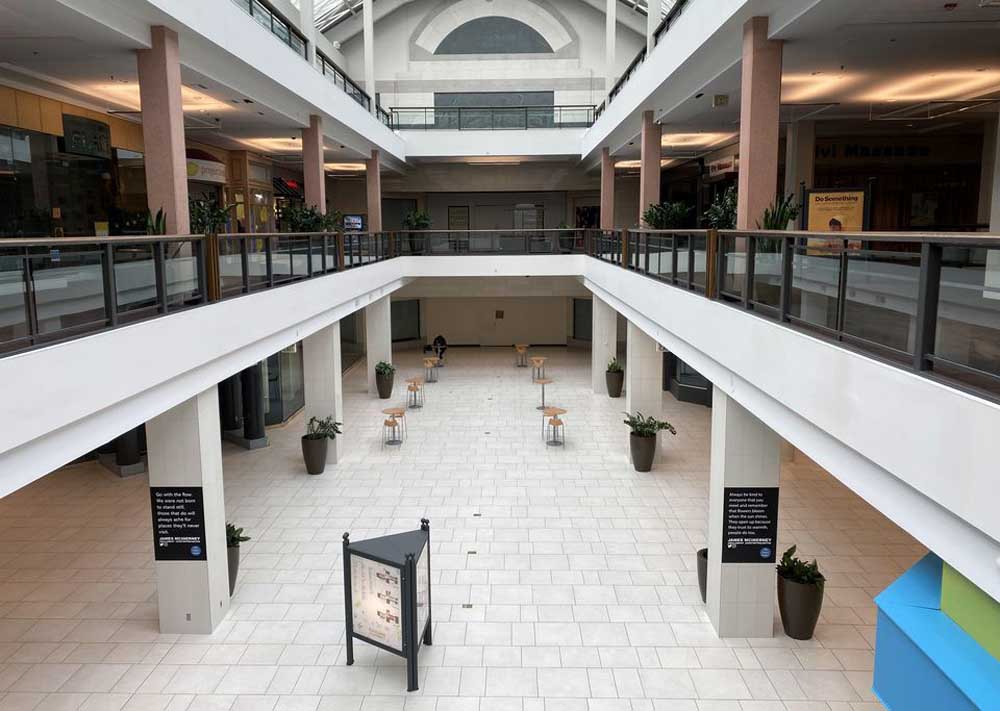Lloyd Center owners reveal plan to redevelop Portland mall, build housing
Published 9:20 am Friday, September 22, 2023

- A nearly empty Lloyd Center in Portland is seen in this November 2021.
The site of Portland’s oldest mall could look completely different in a few years.
Urban Renaissance Group, the Seattle-based developer that co-owns the mall with New York lender KKR Real Estate Finance Trust, unveiled its long-term vision to transform Lloyd Center into a “mixed-use neighborhood” development.
Trending
The developer said the 29.3-acre site’s long term future will include housing, shopping, entertainment venues and preserving the mall’s centerpiece ice rink, or some version of it. Urban Renaissance Group said the “reimagined layout” of the site will include new roadways that connect to Portland’s street grid and add outdoor space reminiscent of the mall’s open-air beginnings.
Urban Renaissance Group’s Portland market leader said that means most of the existing mall will be torn down and redeveloped – at least, over time.
“I think that’s probably the big news here — the mall as it exists, at some point, is likely to go away,” said Tom Kilbane, the managing director in Portland for Urban Renaissance Group. “It’s a long-term plan, and parts of the mall are going to remain for some time. It’s not all going away tomorrow.”
Kilbane said Lloyd Center will remain open for business during the renovations. He said the company continues to offer potential tenants one-year leases. The mall currently has about 120 tenants, according to the developer.
“We don’t want people to worry that the mall is closing right now,” Kilbane said. “We’ve renewed 90% of the existing tenants in the mall, and we’re continuing to talk to new tenants.”
The shopping mall drew attention earlier this summer, after the group behind the yearslong effort to bring a Major League Baseball team to Oregon’s largest city zeroed in on the shopping mall as the potential site.
Trending
The mall’s owners said they’ve talked to city leaders about the idea of bringing a baseball stadium to the Lloyd Center’s site and that remains a possibility.
Kilbane said, however, the first phase of the redevelopment would be to build housing units on the site.
“We have the potential to deliver several thousand units of housing, and we think that’s what makes the most sense to lead off the project,” he said, adding that the companies are also interested in finding an entertainment venue that could act as an anchor tenant. Kilbane said the companies have told the city that they would be interested in bringing the Keller Auditorium, which has been due for improvements and seismic upgrades.
Urban Renaissance Group has submitted its proposal as a master plan to the city’s design commission, setting off a planning process that could last months for a large, central and civically significant site.
The developer said it gathered input from neighborhood and business associations, city leaders, local businesses and residents over the past two years. The company hired a consulting firm that interviewed more than 80 people and conducted a poll of Portland residents that received roughly 600 responses about what people wanted for the future of Lloyd Center.
“We got a lot of feedback about what people are interested in seeing happen on the site, and it’s been a very clear message that people want to see something exciting and a neighborhood,” Kilbane said. “It’s great because that’s very consistent with the direction that we’ve been headed.”
He said the company reached out to neighborhood groups including the Lloyd Community Association, the Lloyd EcoDistrict, Sullivan Gulch Neighborhood Association and Go Lloyd.
Keith Jones, outgoing president of the Lloyd Community Association and longtime resident of the neighborhood, said that the site is “ripe with opportunities to build” housing given the underutilized parking structures and parking lots on the property.
“We’re just really excited to get more housing in. … There’s not a lot of supply, but there’s a whole lot of demand, so I welcome this,” Jones said. “And I think creating elements where there’s people and vibrancy and opening up the grid a little bit more is a really good thing.”
Kilbane said the mall’s current structure is “very inwardly focused” and surrounded by parking garages that are “not very friendly from a pedestrian or a biking perspective.” He said one of the first phases of the project will be to teardown the parking structures to make way for housing projects.
“We’ll be proposing a significant amount of residential development, that’s probably going to be the first phase…it’s going to take many years to complete,” he said. “We won’t see any construction started on the site for at least a couple of years.”
The developer has hired prominent Portland design firm Zimmer Gunsul Frasca Architects LLP as the master planner on the project. The company’s resume includes designing the downtown Multnomah County Justice Center, the Oregon Museum of Science and Industry, Portland International Airport main terminal expansion, and Tom McCall Waterfront Park.
Field Operations, a New York-based landscape architecture firm, is also on the team. The company led the design and construction of Manhattan’s High Line, a 1.5-mile long public park built on an abandoned elevated railroad.
Lloyd Center has been a landmark in Portland since it opened in 1960. Over the years, the mall underwent a series of expansions and renovations, including a major transformation in 1990 that turned the original open-air mall into an enclosed shopping center.
When first built, the mall was billed as the future of shopping and its original owners claimed it was, at the time, the largest shopping center in the world. Centrally located in the Portland area and its close proximity to downtown, the Oregon Convention Center and the Moda Center, the Lloyd Center drew shoppers from all over the region for decades.
Like many other self-enclosed shopping centers, the Lloyd Center has seen its fortunes decline in recent years, and the economic fall-out from the pandemic has exacerbated its problems. Plans to pivot to an entertainment district, complete with a bowling alley and concert venue, also never materialized.
As retail trends changed to shopping online, the anchor stores closed down one by one. Nordstrom shuttered in 2015, followed by Sears and Marshalls in 2018. The mall’s extended closure during COVID-19 lockdowns accelerated the downward spiral, and shopping continued to decline. In January 2021, the mall’s last remaining large department store, Macy’s, closed.
Cypress Equities, the Texas-based commercial real estate firm that previously owned the mall, defaulted on a $177 million loan in 2021 toward the mall’s extensive renovations during the mid-2010s, pushing the mall into foreclosure.
KKR Real Estate Financial Trust, the New York lender, took ownership of the mall in late 2021 and brought on Seattle-based developer Urban Renaissance Group to help revamp the mall and plot its next act. But their long-term vision for the mall hadn’t been clear until Thursday.








